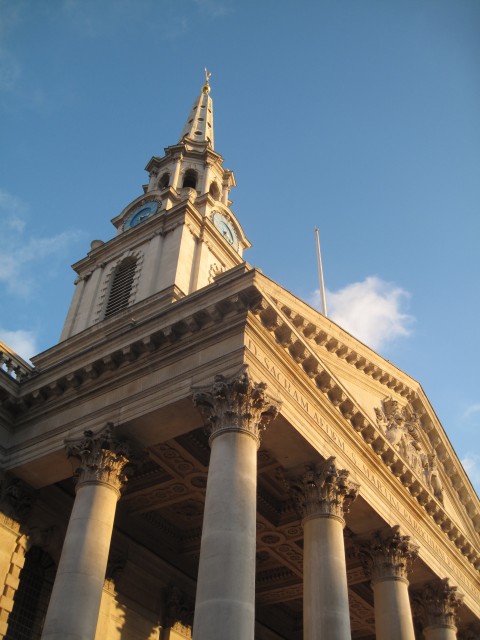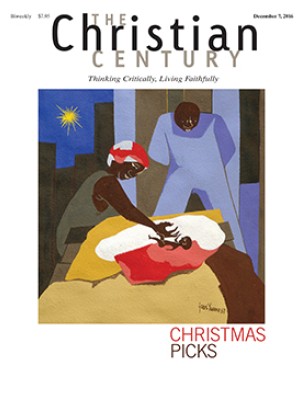What Brexit is revealing
Intolerance won the vote, but St. Martin's witnesses to a different reality.

Several months afterward I still find it hard to talk about Brexit. Britain hasn’t left Europe, but it has chosen to leave the lugubrious, sometimes sclerotic but nonetheless indispensable institution known as the European Union. The result of the referendum was evidently a protest from people who feel they haven’t been heard. Now everyone has to listen.
In 2014 the Scots voted on whether or not to leave the U.K. The No campaign fought on the wrong grounds, and there were constant warnings of major corporations relocating from Edinburgh to London. But the Scots didn’t believe they were simply economic beings: this was about identity over centuries, not wealth over a few years. The result was close. Having learned nothing, the Remain campaign in the 2016 Euro vote fought on exactly the same grounds: we’ll be better off if we stay. It was a huge miscalculation. Those who voted to leave said, “I’m not sure I’m a part of your ‘we,’” and then, “This is about identity, not economics—I don’t feel European, and I want my country back.”
Read our latest issue or browse back issues.
The Scottish referendum was almost lost because of the failure of the No campaign to describe a multicultural society the Scots would be foolish to leave. The Euro referendum was lost because the Remain campaign failed to describe the aspirations of the European ideal in any way the electorate could relate to. For those of us who believe that the EU is a tangible fruit of a Europe that resolved to learn its lessons after two world wars, and that Britain’s membership in Europe is a welcome sign of humility from a country that has finally renounced its global imperial pretensions, the result is devastating.
Sometimes one hears the wrong answer because one has asked the wrong question. A few months later no one really knows what the answer will entail. It feels like a drunken moment late in the party when the guest has told the host and hostess what she really thinks of them but hasn’t yet left. It’s an awkward silence; no one knows what to say; no one can unsay or unhear what has been said; everyone knows deep down it’s not the whole truth, and that in the morning it might feel very different.
From cosmopolitan London, it was hard not to see a harsher, more intolerant, less inclusive future for the U.K. Listening to the campaign felt at times like discovering secrets about one’s family one didn’t want to know—and that in the privileged location of central London, one could pretend weren’t true.
My own church, St. Martin’s, is a community that stands for diversity, welcome, and an international and generous richness of life. Members of our staff come from 25 different countries. Shortly after the vote we held a celebration event to cherish and share the pain of those who heard this result and wondered if they still belong in the U.K. But we are at root a community of faith, and we believe that God, who brings resurrection out of death and speaks truth beyond fear, will bring some good out of this confusing and disorienting event.
For those who’ve lost the public argument there’s only one thing to do. And that’s to turn anger, grief, and dismay into renewed ministry and mission. The way to do that is by example. It may be people have never experienced or even imagined the kind of renewed, participatory, and dynamic community we strive to embody at St. Martin’s. It’s our job to ensure that they do.
I pray that the U.K. finds a kinder, gentler way of talking about immigration. But if it doesn’t, St. Martin’s must remain a place of hospitality and belonging to those on whom our society has turned its back. I pray that the U.K., or what’s left of it, continues to be a model of tolerance, diversity, and respect. But if it doesn’t, St. Martin’s will still seek to be a blessing to all in our country.
I pray that British democracy discovers a way to vote not in fear and self-interest, but in hope and pursuit of the common good. But even if it doesn’t, St. Martin’s will continue to be a community that judges democracy by how safe it is to find oneself in the minority. I pray that the church in the U.K. will come to be regarded by all as a home for the outcast and a refuge for the least and the lost. But even if it does not, St. Martin’s will continue to worship a God who in Christ is made known in the hungry and the stranger.
I believe it’s possible to build a community of humility, generosity, gratitude, grace, truth, and compassion—for which the only word I know is church. A church like St. Martin’s is called to be a living example of what the reconciling, liberating, and transforming love of God can do. It may be that a witness like ours can begin to heal our country and inspire it to take a different, more inclusive, and more hopeful direction.
But even if it doesn’t, we’re going to do it anyway.
A version of this article appears in the December 7 print edition under the title “What Brexit is revealing.”







